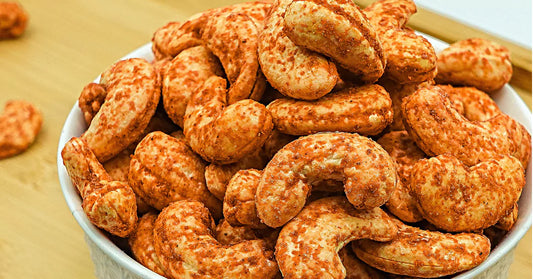Is there scientific research supporting dry fruits' benefits for fatty liver disease?
Short answer: Yes, some scientific studies suggest that certain dry fruits may benefit people with fatty liver disease due to their high antioxidant content and specific nutrients. However, more research is needed for conclusive evidence.
Detailed answer:
- Several studies have explored the potential benefits of dry fruits for fatty liver disease:
- A 2020 study in the Journal of Functional Foods found that raisins may help reduce liver fat accumulation.
- Research published in Food & Function (2019) suggested that dried plums (prunes) could have hepatoprotective effects.
- Specific dry fruits that might be helpful include:
- Raisins: Rich in antioxidants and may help reduce inflammation.
- Prunes: High in fiber and antioxidants, potentially aiding liver health.
- Walnuts: Contain omega-3 fatty acids and antioxidants that may support liver function.
- The potential benefits are attributed to:
- High antioxidant content, which may help reduce oxidative stress in the liver.
- Specific nutrients like polyphenols and fiber, which may support liver health.
Are there limitations or potential downsides to consuming dry fruits for fatty liver disease?
Short answer: Yes, there are potential downsides. The high sugar and calorie content of dry fruits can be problematic for people with fatty liver disease if consumed in excess, potentially exacerbating the condition.
Detailed answer:
- Potential limitations and downsides include:
- High sugar content: Dried fruits are concentrated sources of natural sugars, which can contribute to increased liver fat if consumed excessively.
- Calorie density: Dry fruits are calorie-dense, which may lead to weight gain if not consumed in moderation.
- Portion control challenges: Due to their small size and sweet taste, it's easy to overeat dried fruits.
- Considerations for people with fatty liver disease:
- Monitor blood sugar levels, especially if diabetic or pre-diabetic.
- Be mindful of overall calorie intake to maintain a healthy weight.
- Choose unsweetened varieties to avoid added sugars.
Can dry fruits substitute other strategies for managing fatty liver disease?
Short answer: No, incorporating dry fruits into your diet should not be considered a substitute for other proven strategies like exercise, medication, or a balanced diet. Always consult a doctor for comprehensive fatty liver management.
Detailed answer:
- Dry fruits should be part of a holistic approach to fatty liver management:
- They can complement, but not replace, exercise and physical activity.
- Dry fruits cannot substitute prescribed medications or medical treatments.
- They should be incorporated into a balanced, nutrient-rich diet.
- Key strategies for managing fatty liver disease include:
- Regular exercise and physical activity.
- Maintaining a healthy weight.
- Following a balanced, nutrient-rich diet.
- Limiting alcohol consumption.
- Taking prescribed medications as directed by a healthcare provider.
- Always consult a healthcare professional before making significant dietary changes.
Are there any dry fruits to completely avoid with fatty liver disease?
Short answer: While no dry fruits need to be completely avoided, those with very high sugar content like candied fruits or those with added sugars should be limited or avoided by people with fatty liver disease.
Detailed answer:
- Dry fruits to limit or avoid:
- Candied fruits: Often contain added sugars and preservatives.
- Sweetened dried fruits: May have extra sugar added during processing.
- Dried fruits with very high natural sugar content: Like dates, should be consumed in moderation.
- Better choices for fatty liver disease:
- Unsweetened dried berries: Rich in antioxidants with lower sugar content.
- Walnuts and almonds: Provide healthy fats and fiber.
- Dried apricots: Offer nutrients with moderate sugar content.
- Always check labels for added sugars and opt for unsweetened varieties when possible.
Should I consult a doctor before changing my diet for fatty liver disease?
Short answer: Yes, it's crucial to consult a doctor or registered dietitian before making significant dietary changes for fatty liver disease. They can provide personalized advice based on your specific health condition.
Detailed answer:
- Reasons to consult a healthcare professional:
- To get a comprehensive assessment of your liver health.
- To receive personalized dietary recommendations.
- To ensure any changes don't interfere with existing treatments or medications.
- A healthcare professional can help:
- Determine appropriate portion sizes of dry fruits for your condition.
- Integrate dry fruits into a balanced meal plan.
- Monitor your progress and adjust recommendations as needed.
- Regular follow-ups are important to track the effectiveness of dietary changes.
How much dried fruit should I consume for potential benefits without drawbacks?
Short answer: For potential benefits without drawbacks, limit dried fruit consumption to about 1-2 tablespoons (20-30 grams) per day. This provides nutrients while minimizing sugar and calorie intake. Individual needs may vary.
Detailed answer:
- General guidelines for dried fruit consumption:
- Aim for 1-2 tablespoons (20-30 grams) per day.
- Choose unsweetened varieties to avoid extra sugar.
- Incorporate dried fruits as part of a balanced meal or snack.
- Factors affecting recommended intake:
- Individual calorie needs and weight management goals.
- Overall diet quality and nutrient intake.
- Severity of fatty liver disease and other health conditions.
- Monitor your response to dried fruit consumption:
- Track blood sugar levels if diabetic or pre-diabetic.
- Observe any changes in weight or liver function tests.
- Adjust intake based on how your body responds and your doctor's advice.
How can I incorporate dried fruits into my diet without overdoing it?
Short answer: Incorporate dried fruits in small amounts as part of balanced meals or snacks. Add them to oatmeal, yogurt, or salads. Pair with protein or healthy fats to slow sugar absorption and increase satiety.
Detailed answer:
- Strategies for incorporating dried fruits:
- Add a small handful to morning oatmeal or whole-grain cereal.
- Mix into Greek yogurt for a protein-rich snack.
- Sprinkle on salads for added flavor and nutrients.
- Use as a topping for baked sweet potatoes or squash.
- Tips to prevent overdoing it:
- Pre-portion dried fruits into small containers or baggies.
- Combine with nuts or seeds to increase satiety and slow sugar absorption.
- Use dried fruits as a natural sweetener in recipes instead of added sugars.
- Balanced snack ideas:
- Apple slices with almond butter and a few raisins.
- Unsweetened Greek yogurt with a sprinkle of chopped walnuts and dried berries.
- Whole grain crackers with hummus and a small amount of chopped dried apricots.
Conclusion
While some dry fruits may offer potential benefits for fatty liver disease due to their antioxidant content and specific nutrients, it's crucial to consume them in moderation. The high sugar and calorie content of dried fruits means they should be incorporated thoughtfully into a balanced diet. Always consult with a healthcare professional before making significant dietary changes, especially when managing a condition like fatty liver disease. By choosing unsweetened varieties, controlling portion sizes, and combining dried fruits with other nutrient-dense foods, you can potentially enjoy their benefits while minimizing risks. Remember, dried fruits should complement, not replace, other important strategies for managing fatty liver disease, such as regular exercise, maintaining a healthy weight, and following medical advice.














